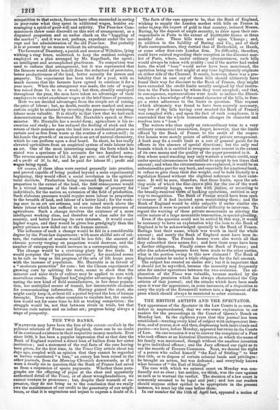THE TWO BANKS.
WHATEVER may have been the fate of the entente cordiale in the political relations of France and England, there can be no doubt of its continued existence in their respective money-markets. Ever since 1839, it has been a popular impression that at that date the Bank of England received a direct loan of bullion from her sister Institution; and a statement of the real facts of the case having been given, for the first time, in the Times City article about ten days ago, coupled with an opinion that they cannot be regarded as having constituted "a loan," an outcry has been raised in the other journals, from the Morning Chronicle downwards, as if it were a deadly sin to question that the Bank of France had saved us from a suspension of specie payments. Whether these para- graphs are the offspring_ of pique at the clear and apparently authorized detail of the Times, or of sheer wrongheadedness, we cannot venture to pronounce ; but, despite their warmth of ex- pression, they do not bring us to the conclusion that we really owe the maintenance of our credit to the generosity of our neigh- bours, or that it is ungracious and unjust to express a doubt of it.
The facts of the case appear to be, that the Bank of England, wishing to supply the London market with bills on France in order to.stop the export of gold to that country, induced Messrs. Baring, by the deposit of ample security, to draw upon their cor- respondents in Paris to the extent of 40,000,000 francs at three months' date. These bills were sold upon 'Change ; and, in addition to the liability of Baring and Co., and of their Paris correspondents, they carried that of Rothschild, or Heath, or some other first-rate London firm. No difficulty, therefore, could have existed regarding their reception in the discount mar- ket of Paris, where, under ordinary circumstances, such bills would always be taken with avidity : and if the matter had ended here, the word "loan" would never have been mentioned, the operation being one that might at any time legitimately originate on either side of the Channel. It seems, however, there was a pro- bability that in case any of these bills should ultimately have found their way for discount to the Bank of France, they might have exceeded the credit limits usually assigned by that institu- tion to the Paris houses by whom they were accepted ; and that, in consequence, representations were made to induce the Direct- ors, under a knowledge of the sound character of the bills, to fore- go a strict adherence to the limits in question. This request (which ultimately was found to have been scarcely necessary, very few of the bills having ever reached the Bank of France) was complied with; and upon the fact of such compliance, it is contended that the whole transaction changes its character and resolves into a "loan."
The writers who thus apply an extraordinary term to a very ordinary commercial transaction, forget, however, that the limits affixed by the Bank of France to the credit of the respec- tive houses were merely points of arbitrary private arrangement. A bank may fix a credit limit as a sort of general guide for its officers in the absence of special directions ; but the only real bounds which it is entitled to recognize must consist in the extent of its own means and the quality of the paper presented to it. A. firm whose usual standing may only warrant a certain credit, may under special circumstances be entitled to accept to_ten times that amount ; and when the circumstances are explained, it would bean unbusinesslike part for any bank, and especially for a national bank, to refuse to give them their due weight, and to hold literally to a regulation framed without the slightest reference to their exist- ence. It will be seen, theFefore, that those limits, upon the set- ting aside of which the fine-drawn plea for the use of the word "loan" entirely hangs, were not with justice, or according to the broadly-received entiVs of banking operations, entitled in any way to recognition. The Bank Of Framed would have been open to-censure if it had insisted upon maintaining them ; and the Bank of England would be alike culpable if under similar cir- cumstances it were to permit a similar difficulty to intervene. To regard the waiving of these private memoranda as altering the entire nature of a large mercantile transaction is special-pleading.
Even if the question could not be settled hi this way, it would be necessary to have an explanation Why the loan to the Bank of England is to be acknowledged specially•vo the Bank 'a France. Barings lent their name, which was worth in itself the whole amount ; and surely the Bank of England must have been in- debted to them. The French houses were also worth all that they subscribed their names for; and here there must have been a further obligation. Finally comes the Bank of France ; and after due acknowledgments have been made to the other parties, what is the portion owing to this new claimant ? The Bank of England cannot be under a triple obligation for the full amount. The subject has created an undue stir ; but it is important that it should not be mystified, because the necessity may frequently arise for similar operations between the two countries. The ex- planation of the Times was valuable, because marked by the businesslike precision which has always characterized the City articles of that journal; and the attacks which have been made upon it wear the appearance, in some instances, of a disposition to carry the style of the Eatanswill writers into a department of the press which should always be restricted to sober statement.


























 Previous page
Previous page